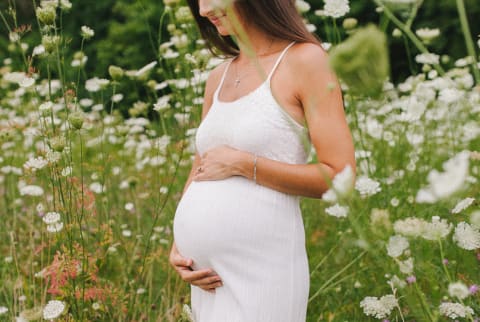Advertisement
3 Pregnancy-Safe Skin Care Myths This Derm & Mom Wants To Debunk


"If there's any time to invest in yourself, it's during pregnancy. I mean, what a responsibility: You are growing a human being. It's a hugely important time to pamper yourself because there are so many days that are so hard and even during postpartum. So if you need a pickup? I'm going to endorse that fully," says board-certified dermatologist Sam Ellis, M.D., who counts herself as a new mom.
In this episode of Clean Beauty School, I talked with Ellis about how to care for your skin while pregnant and breastfeeding. Not only did she share her own experiences while becoming a mother, but she talked about how she approaches talking about this with her patients.
And as she notes in the episode, unfortunately there are a lot of misconceptions about "pregnancy safe" skin care, what you can't (and can!) use, and the exact changes that are happening in your body.
The episode is packed with good skin care advice in general, but it's a must-listen for anyone pregnant or thinking about becoming pregnant in the future.
Myth 1: Pregnancy safe is a regulated term
File "pregnancy safe" under the same category as "clean," "natural," "hypoallergenic," and "derm-approved." By which we mean: There is no official definition, and it's unregulated. When you see it attached to skin care products, consider it a marketing term rather than an official one.
“Pregnancy safe is an incredibly ambiguous term—and unfortunately, it really doesn’t mean anything,” says Ellis. “Does it mean that it comes with no risk whatsoever? Because that’s a tough thing to dance around.”
That’s not to say that the term can’t be a useful guide in your hunt for products—as most brands who use it do avoid the major no-no ingredients. It’s just more to say that you should be aware that there's no regulatory body that’s watching out for how the phrase is used.
Myth 2: There are thousands of ingredients you need to cut out
"I like to destigmatize ingredients for people because the vast majority of things that people are already using in their beauty routine, whether it's makeup or skin care, are generally OK to use. It's already a hard time, where people feel a lot of pressure to be perfect, and this is an area where we can ease a bit of that burden," she says. "The list of ingredients you really shouldn't use isn't that long." The main ones on that list? Retinol, hydroquinone, and minoxidil.
And anything else you choose to cut from your routine during this time is up to you: We are firm believers that everyone is entitled to use whatever ingredients suit their personal standards of "clean." So how you want to approach your skin care routine during this time is very personal. But rest assured: The list of ingredients that M.D.s tell you that you need to cut out is quite short.
And, as Ellis says, if you choose to pare down your routine at this time, feel free. "Healthy aging is a lifelong commitment—it's OK to take a little break on your 'anti-aging' routine while pregnant," she says. "Skin care ebbs and flows throughout your entire life."
Myth 3: Stretch marks are a sign you didn't hydrate enough
"Your skin is very adaptable—it can grow and change with you. However, if your body expands faster than your skin can stretch, it will form scar tissue deep in the skin," Ellis says.
And here's the truth: Whether or not you develop stretch marks from pregnancy almost entirely comes down to genetics. And while keeping your skin hydrated while your belly and body are growing is important, if you develop stretch marks during the pregnancy it is not because you didn't do enough or you didn't pick the right product. Sometimes stretch marks just happen—and there's nothing wrong with them.
For more info, tune in here.